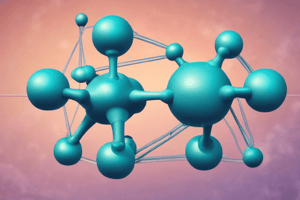Podcast
Questions and Answers
Covalent bonds form when two non-metal atoms share ______ electrons
Covalent bonds form when two non-metal atoms share ______ electrons
valence
Covalent bonds are strong and require a lot of ______ to break them
Covalent bonds are strong and require a lot of ______ to break them
energy
Substances with covalent bonds often form molecules with low ______ and boiling points
Substances with covalent bonds often form molecules with low ______ and boiling points
melting
Atoms may form multiple covalent bonds; they are not restricted to sharing electrons with only one other ______ but two or more
Atoms may form multiple covalent bonds; they are not restricted to sharing electrons with only one other ______ but two or more
The number of covalent bonds is equal to eight minus the ______ number
The number of covalent bonds is equal to eight minus the ______ number
Flashcards are hidden until you start studying
Study Notes
Covalent Bonding
- Covalent bonds form when two non-metal atoms share electrons, specifically the valence electrons.
- Covalent bonds are strong and require a significant amount of energy to break.
- Substances with covalent bonds often have low melting and boiling points, such as hydrogen and water.
- Within molecules, covalent bonds are strong, but intermolecular forces between molecules are weak.
- A small amount of heat energy is required to separate molecules from one another.
- Atoms can form multiple covalent bonds with two or more atoms, not limited to just one.
- Atoms of different elements can form one, two, three, or four covalent bonds with other atoms.
Key Fact
- The number of covalent bonds an atom can form is equal to eight minus the group number of the element.
Studying That Suits You
Use AI to generate personalized quizzes and flashcards to suit your learning preferences.




